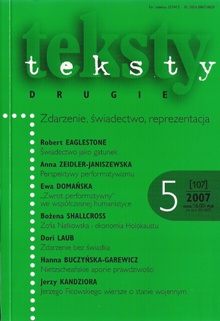Dziwne mydło. Zofia Nałkowska i ekonomia Zagłady (przeł. Kinga Maciejewska)
The Uncanny Soap: Zofia Nałkowska and the economy of the Holocaust (trans. Kinga Maciejewska)
Author(s): Bożena ShallcrossSubject(s): Literary Texts
Published by: Instytut Badań Literackich Polskiej Akademii Nauk
Keywords: Testimony; Holocaust; Philosophy
Summary/Abstract: This article is an abridged version of a chapter of a forthcoming book by B. Shalcross titled Object. Proximity and Vestiges. The author focuses on material objects and the human corpse as a trace/testimony which was to be annihilated in the economy of the Holocaust. Objects and corpses were subject to a metamorphosis whose first stage was to render them ontically equal. The author’s starting point was an analysis of use by the Nazis of human corpses as a raw material, e.g. for production of soap. Human body approached as a commodity is intrinsically combined with a modern rational warfare system and with its accompanying technological accountability that has replaced a moral responsibility. The consequence is a paradox described by B. Shalcross: the mass-scale killing removed the threat and repugnance represented by Jewish (dead) bodies.
Journal: Teksty Drugie
- Issue Year: 2007
- Issue No: 5
- Page Range: 62-73
- Page Count: 12
- Language: Polish

